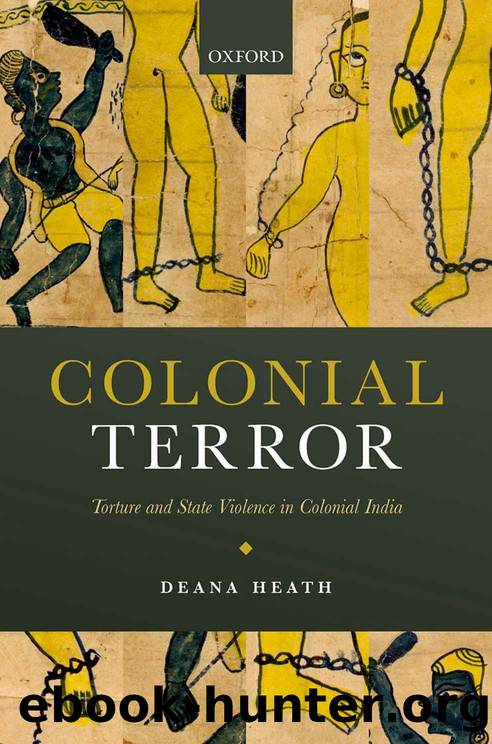Colonial Terror by Deana Heath

Author:Deana Heath [Heath, Deana]
Language: eng
Format: epub
Publisher: OUP Oxford
Published: 2021-03-23T07:00:00+00:00
The Confession, Law, and Official Discretion
⦠it will be infinitely for the advantage of the police, and consequently of the people at large, to make it illegal for any one, police or magistrate, to record the confession of any accused person before he is actually put upon his trial ⦠If the police cannot obtain sufficient evidence against an accused person to send him up for trial apart from a confession, he ought not to be sent up for trial at all.48
An analysis of the law relating to confessions in colonial India reveals the degree of official discretion accorded to the police to engage in extra-legal violence. The historical power of the confession lies in its ability to provide âproofâ when other evidence is wanting, as well as to virtually absolve the prosecution from the difficult task of seeking such evidence.49 It is for this reason that torture has historically played such a key role in obtaining confessions. In the Roman-canon law of evidence that governed judicial procedure in Europe from the Middle Ages, torture was resorted to in order to extract a confession in cases of âhalf proofâ, namely the testimony of only one eyewitness (since the testimony of two was sufficient to secure conviction without needing to resort to torture) or insufficient circumstantial evidence, although the purpose was to gather details of the crime that no innocent person could purportedly know rather than to elicit a guilty plea.50 Confessions obtained through torture had to appear, however, to be voluntary, and innumerable rules were created to ensure their reliability.51 Such practices were by no means unique to Europe. In the case of India the ancient Indian treatise on statecraft, the ArthaÅÄtra, contains a whole chapter on the rules regarding the use of torture to elicit confessions, which has transpired later in Europe was to be applied if the defendantâs evidence could not be attested by reliable witnesses.52 As in Europe, such confessions had to be substantiated through supporting evidence, and there were other provisions to protect innocent persons from being convicted of crimes they had not committed.53
But although judicial torture may have been hedged with safeguards designed to prevent the condemnation of innocent people, such safeguards were always, as John Langbein concludes, âimperfectâ.54 In Europe, confessions obtained through torture were only deemed valid, for example, if the accused publicly repeated their confession in a courtroom within the next twenty-four hours; if the accused, as was often the case, recanted their confession when asked to repeat it this generally led to a further âexaminationâ in the torture chamber until the desired result was obtained.55 The requirement that confessions procured through torture be verified through other forms of evidence was also not enforced in all jurisdictions, or was enforced only âindifferentlyâ.56 That safeguards designed to protect the innocent from being convicted under judicial torture were doomed to failure, for Langbein, is because âthe law of proof was absolutely dependent upon coerced confessionsâ.57 But it is not only in systems of judicial
Download
This site does not store any files on its server. We only index and link to content provided by other sites. Please contact the content providers to delete copyright contents if any and email us, we'll remove relevant links or contents immediately.
| Africa | Americas |
| Arctic & Antarctica | Asia |
| Australia & Oceania | Europe |
| Middle East | Russia |
| United States | World |
| Ancient Civilizations | Military |
| Historical Study & Educational Resources |
Never by Ken Follett(2873)
The Man Who Died Twice by Richard Osman(2290)
Machine Learning at Scale with H2O by Gregory Keys | David Whiting(2267)
Fairy Tale by Stephen King(2058)
Will by Will Smith(2033)
Rationality by Steven Pinker(1761)
The Dawn of Everything: A New History of Humanity by David Graeber & David Wengrow(1564)
The Dark Hours by Michael Connelly(1562)
Principles for Dealing With the Changing World Order: Why Nations Succeed and Fail by Ray Dalio(1368)
Friends, Lovers, and the Big Terrible Thing by Matthew Perry(1324)
A Short History of War by Jeremy Black(1295)
HBR's 10 Must Reads 2022 by Harvard Business Review(1251)
Go Tell the Bees That I Am Gone by Diana Gabaldon(1231)
Can't Hurt Me: Master Your Mind and Defy the Odds - Clean Edition by David Goggins(1223)
515945210 by Unknown(1205)
Fear No Evil by James Patterson(1106)
443319537 by Unknown(1069)
Works by Richard Wright(1017)
Going There by Katie Couric(989)
